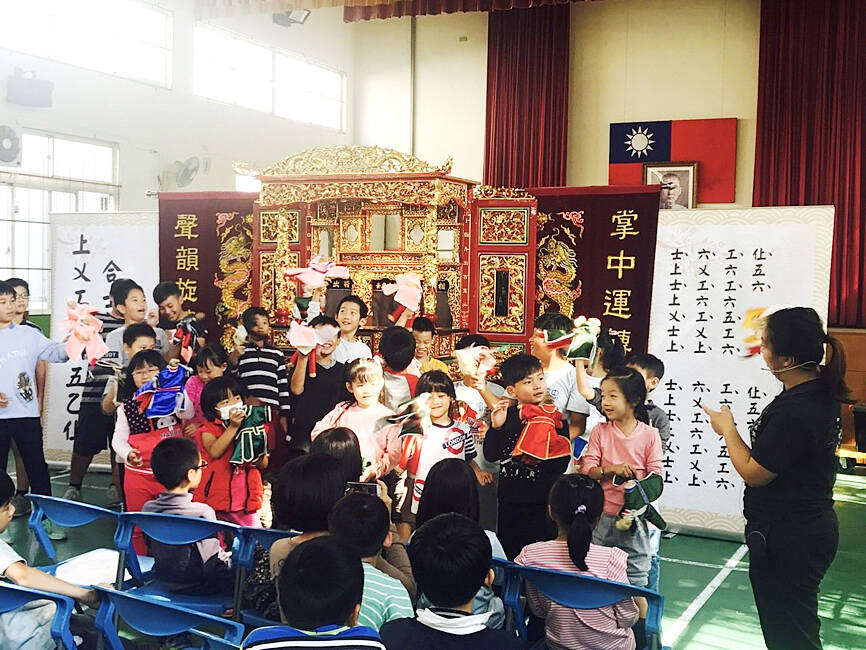A majority of Taiwanese, or 68.4 percent, feel that “native” languages are in danger of disappearing, a poll released yesterday by the Professor Huang Kun-huei Education Foundation showed.
Previous policies vigorously promoting Mandarin have crippled the development of native languages, foundation chairman Huang Kun-heui (黃昆輝) said.
Of the poll’s respondents, 37.2 percent said that the Ministry of Education’s policies effectively preserve native languages, he said.

Photo courtesy of the Taoyuan Department of Education
While 93.9 percent of those polled said that speaking native languages with family members is the best way to learn a language, 67.5 percent said their family members could not speak native languages, demonstrating that such methods are not the most effective, Huang said.
Citing Ministry of Culture data, Huang said that the use of Hoklo (commonly known as Taiwanese) has dropped by nearly 60 percent within the past three generations, while the use of Hakka has fallen 70 percent, and the use of indigenous languages has plummeted by almost 90 percent.
The less a language is used, the more likely it is of becoming endangered or extinct, and the preservation and restoration of native languages in Taiwan is a task that cannot be put off any longer, Huang said.
Foundation member Feng Ching-huang (馮清皇) said that about 64.9 percent of the respondents still used their native tongue daily.
Broken down into region, Tainan, and Yunlin and Chiayi counties had the largest percentage of people who speak a native tongue daily at 82.4 percent, followed by Taichung, and Changhua and Nantou counties at 73.6 percent, and Kaohsiung, and Pingtung and Penghu counties at 73.3 percent, Feng said.
The poll showed that the use of native languages dropped in conjunction with the respondents’ age, Huang said.
Feng said that 91.5 percent of respondents aged 65 or older used a native tongue frequently, followed by those aged 50 to 64 at 73.3 percent.
Respondents with a junior-high school education or lower used native languages the most, at 90.6 percent, followed by those with a high-school or vocational high-school education at 70.2 percent, Feng said.
National Cheng Chi University Graduate Institute of Taiwan History chairman Hsueh Hua-yuan (薛化元) said it is a basic human right to use one’s native language.
Government policies have previously infringed upon that right, resulting in the prevalence of Mandarin in education, government and mass media, Hsueh said.
The Development of National Languages Act (國家語言發展法) has provided a legal basis to help protect local languages, but the preservation and development of the native languages of multiple ethnicities is still an uphill battle, he said.

The US government has signed defense cooperation agreements with Japan and the Philippines to boost the deterrence capabilities of countries in the first island chain, a report by the National Security Bureau (NSB) showed. The main countries on the first island chain include the two nations and Taiwan. The bureau is to present the report at a meeting of the legislature’s Foreign Affairs and National Defense Committee tomorrow. The US military has deployed Typhon missile systems to Japan’s Yamaguchi Prefecture and Zambales province in the Philippines during their joint military exercises. It has also installed NMESIS anti-ship systems in Japan’s Okinawa

‘WIN-WIN’: The Philippines, and central and eastern European countries are important potential drone cooperation partners, Minister of Foreign Affairs Lin Chia-lung said Minister of Foreign Affairs Lin Chia-lung (林佳龍) in an interview published yesterday confirmed that there are joint ventures between Taiwan and Poland in the drone industry. Lin made the remark in an exclusive interview with the Chinese-language Liberty Times (the Taipei Times’ sister paper). The government-backed Taiwan Excellence Drone International Business Opportunities Alliance and the Polish Chamber of Unmanned Systems on Wednesday last week signed a memorandum of understanding in Poland to develop a “non-China” supply chain for drones and work together on key technologies. Asked if Taiwan prioritized Poland among central and eastern European countries in drone collaboration, Lin

NO CONFIDENCE MOTION? The premier said that being toppled by the legislature for defending the Constitution would be a democratic badge of honor for him Premier Cho Jung-tai (卓榮泰) yesterday announced that the Cabinet would not countersign the amendments to the local revenue-sharing law passed by the Legislative Yuan last month. Cho said the decision not to countersign the amendments to the Act Governing the Allocation of Government Revenues and Expenditures (財政收支劃分法) was made in accordance with the Constitution. “The decision aims to safeguard our Constitution,” he said. The Constitution stipulates the president shall, in accordance with law, promulgate laws and issue mandates with the countersignature of the head of the Executive Yuan, or with the countersignatures of both the head of the Executive Yuan and ministers or

CABINET APPROVAL: People seeking assisted reproduction must be assessed to determine whether they would be adequate parents, the planned changes say Proposed amendments to the Assisted Reproduction Act (人工生殖法) advanced yesterday by the Executive Yuan would grant married lesbian couples and single women access to legal assisted reproductive services. The proposed revisions are “based on the fundamental principle of respecting women’s reproductive autonomy,” Cabinet spokesperson Michelle Lee (李慧芝) quoted Vice Premier Cheng Li-chiun (鄭麗君), who presided over a Cabinet meeting earlier yesterday, as saying at the briefing. The draft amendment would be submitted to the legislature for review. The Ministry of Health and Welfare, which proposed the amendments, said that experts on children’s rights, gender equality, law and medicine attended cross-disciplinary meetings, adding that